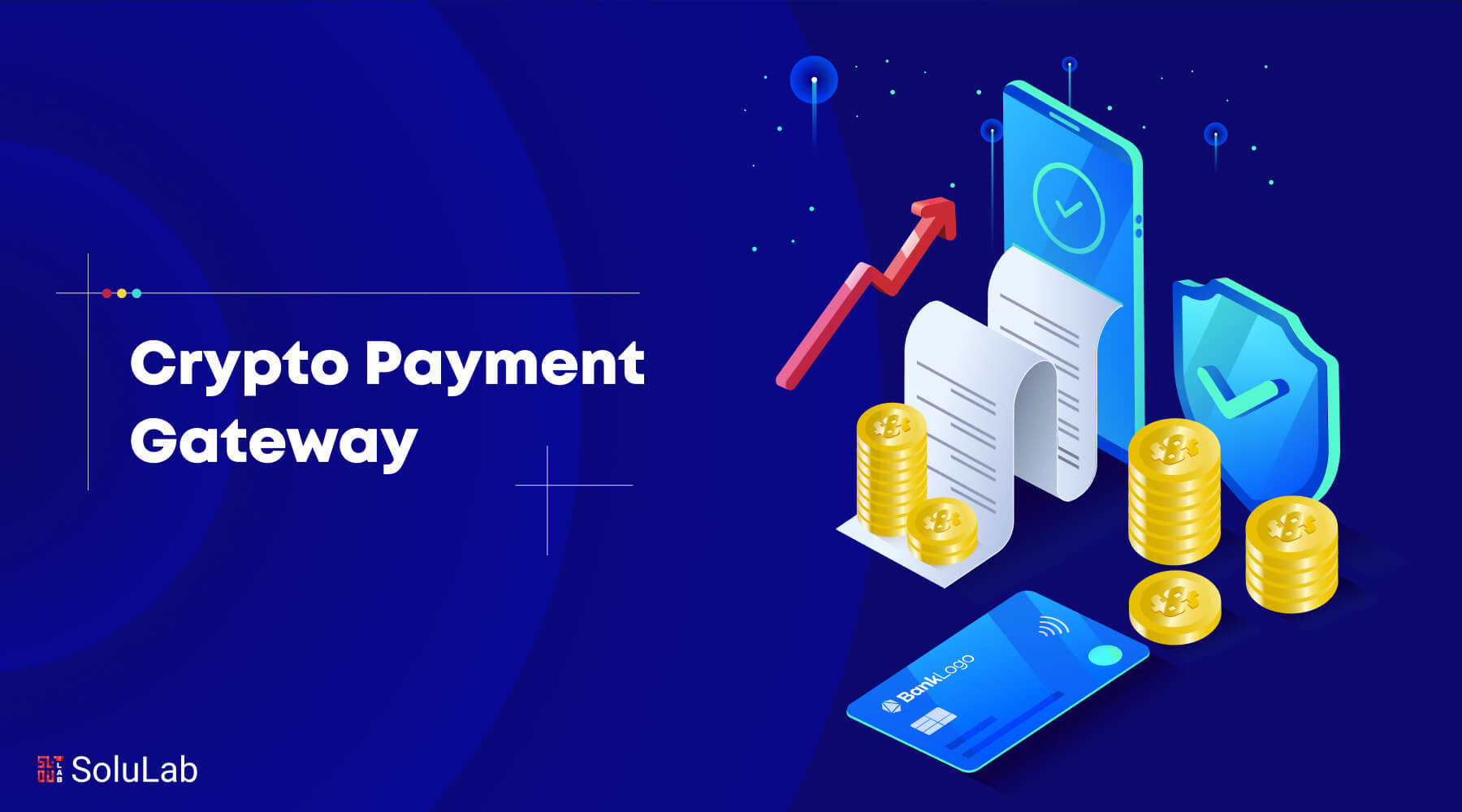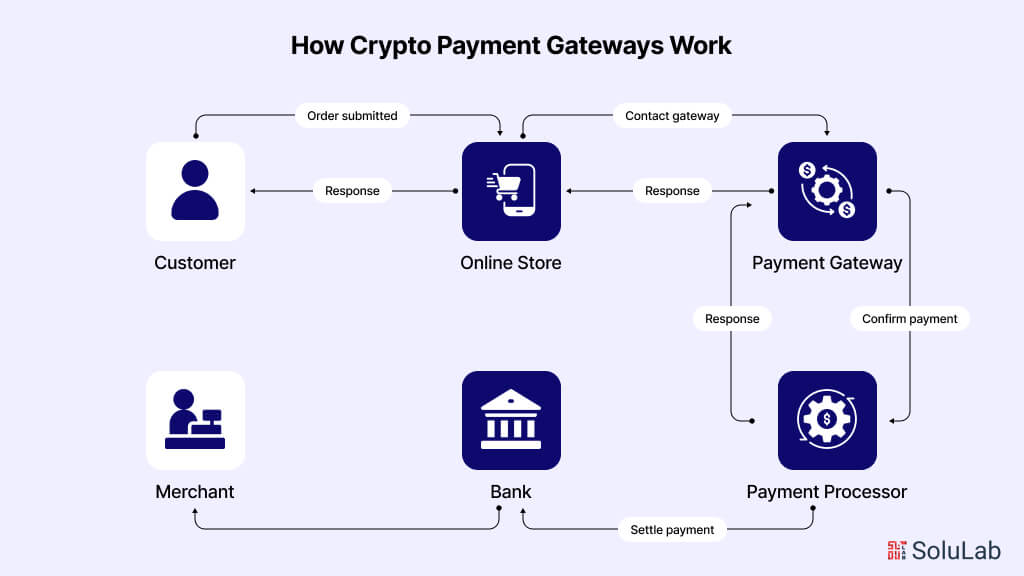
In payment processing, cryptocurrencies are gradually evolving into a standard. Businesses are recognizing the potential of cryptocurrencies and are embracing them as a valid payment option, similar to fiat currencies. Developing a crypto payment gateway has become a strategic choice for brands seeking to stay ahead in the market and maximize their revenue opportunities. As businesses realize the advantages of incorporating digital currencies, the demand for crypto payment gateway development has skyrocketed.
This comprehensive guide aims to assist businesses in integrating crypto payment gateways into their e-commerce platforms. It offers a systematic roadmap that simplifies the development and deployment process. The guide delves into the fundamentals of utilizing blockchain technology for secure payment processing. By adhering to the guidance provided in this document, businesses can streamline and enhance their payment processes, positioning themselves for success in the evolving digital economy.
What are Crypto Payment Gateways?
In today’s digital world, where transactions happen around the clock, crypto payment gateways have become crucial tools for businesses looking to leverage the potential of cryptocurrencies. With the growing popularity of crypto assets such as Bitcoin and Ethereum, the demand for fast and secure crypto payment solutions has skyrocketed. Crypto payment gateways serve as intermediaries between merchants and customers, facilitating the transfer of cryptocurrencies for goods and services. Think of them as virtual checkout counters for digital assets. These gateways allow businesses to accept payments in various cryptocurrencies, which they can then convert into fiat currencies or hold as digital assets, based on their preferences.
In the realm of e-commerce, where speed, security, and accessibility are paramount, the development of crypto payment gateways offers numerous advantages. By integrating these crypto payment gateways into their platforms, businesses can reach a broader customer base, including those who prefer to use digital currencies for transactions. This expanded reach not only boosts profits but also positions businesses at the forefront of technological advancements.
Advantages of Crypto Payment Gateway Development
The development of crypto payment gateways provides substantial benefits for various stakeholders. It represents a paradigm shift in the world of online transactions, offering numerous advantages for businesses, customers, and developers. Crypto payment gateways enhance security, enable global accessibility, and foster innovation, while also contributing to economic empowerment. Let’s delve into the specific ways in which crypto payment gateway development creates value for each of these stakeholders:
Benefits for Customers
1. Enhanced Security and Privacy: Crypto payment gateways offer customers strengthened security and privacy due to the decentralized and encrypted nature of blockchain technology. Transactions are highly secure, transparent, and immune to tampering, minimizing the risk of fraud and identity theft.
2. Unmatched Financial Sovereignty: Crypto payment gateway development empowers customers with unparalleled financial sovereignty, granting them full control over their funds. Unlike traditional banking systems where accounts can be frozen or transactions blocked, crypto transactions provide customers with ultimate ownership and autonomy over their assets.
3. Global Accessibility: With payment gateway cryptocurrency, customers can transcend geographical boundaries and engage in seamless borderless spending. They can purchase goods from international merchants or send remittances overseas without facing traditional banking restrictions or incurring exorbitant fees.
4. Rapid Transaction Processing: Cryptocurrency transactions are processed virtually instantaneously, offering customers faster payment processing and settlement times compared to conventional payment methods. This speed and efficiency enhance the shopping experience, particularly for online purchases.
5. Financial Inclusion: Crypto payment gateway development enables individuals who lack traditional banking accounts or access to participate in digital transactions using cryptocurrencies. This fosters economic empowerment and inclusion, bridging the gap for unbanked and underserved communities.
6. Rewarding Experiences: Through the integration of tokenization and decentralized finance (DeFi) protocols, crypto payment gateways offer customers unique rewards and incentives for their transactions. Loyalty tokens, yield farming opportunities, and diverse reward programs enhance the overall shopping experience and contribute to financial well-being.
7. Privacy and Anonymity: Crypto payment gateways prioritize privacy and anonymity, allowing customers to conduct transactions without revealing sensitive personal information. This heightened privacy protection instills trust and security, particularly in an era of heightened concerns over data breaches and identity theft.
Benefits for Merchants
- Enhanced Cost Savings: Merchants using crypto payments experience lower transaction fees compared to conventional payment methods. This allows them to retain a higher percentage of revenue per transaction.
- Global Reach Expansion: Accepting crypto payments broadens a merchant’s customer base globally. Best crypto payment gateway development eliminates barriers like currency conversion fees and regulatory restrictions, enabling merchants to reach customers worldwide.
- Minimized Chargebacks: Crypto transactions’ irreversible nature on the blockchain reduces the likelihood of chargebacks and payment disputes. This eliminates the time and resources spent on managing chargeback claims.
- Innovative Marketing Differentiation: Accepting crypto payments sets merchants apart in the market, showcasing their commitment to innovation. This attracts tech-savvy customers and builds a positive brand reputation.
- Token-Based Loyalty Programs: Payment gateway cryptocurrency facilitate the creation of tokenized loyalty programs. Branded tokens redeemable for discounts, merchandise, or exclusive offers foster stronger customer engagement and loyalty.
- Micropayment and Microtransaction Support: Crypto payment gateway development enables merchants to accept micropayments and microtransactions with low fees. This opens up new revenue streams, particularly in industries such as content creation, gaming, and digital media.
- Automated Business Operations with Smart Contracts: Integrating smart contracts into a payment gateway for cryptocurrency development automates various business aspects like contract execution, payment settlements, and supply chain management. This enhances efficiency, reduces administrative burden, and minimizes errors and disputes.
- Immediate Settlements for Cash Flow Optimization: Crypto payment gateway development ensures speedy payment processing for merchants. Funds are instantly accessible, unlike traditional payment systems with delays. This facilitates smoother cash flow management, enabling reinvestment or short-term bill payments with ease.
Benefits for Project Owners
1. Diversification of Revenue Streams and Risk Mitigation: By embracing crypto payment gateway development, project owners can diversify their revenue streams and reduce reliance on traditional payment methods. Offering both crypto and fiat currencies shields projects from market volatility and currency fluctuations, thus enhancing financial stability and security.
2. Capitalizing on Cryptocurrency Adoption: Cryptocurrencies have transcended niche trends and evolved into global phenomena reshaping finance. Investing in cryptocurrency payment gateway development positions projects at the forefront of this transformative wave, leveraging the growing acceptance and integration of cryptocurrencies in mainstream commerce. This strategic move ensures relevance and competitiveness in a digital-first era.
3. Enhancing Customer Trust and Loyalty: Integrating crypto payment options demonstrates a commitment to customer-centricity, catering to the preferences of tech-savvy consumers. By offering convenience, security, and transparency, project owners build trust and loyalty among customers who value these attributes.
4. Streamlined Transactions Without Intermediaries: Best crypto payment gateway development facilitates peer-to-peer transactions, eliminating intermediaries like banks and payment processors. Bypassing these entities minimizes unnecessary fees, delays, and complexities, enabling faster and more cost-effective transactions.
5. Operational Cost Savings: The absence of intermediaries allows project owners to save on expenses typically associated with traditional financial intermediaries. These operational cost savings can be reinvested into business growth, expansion, or passed on to customers through reduced prices.
How Crypto Payment Gateways Work?

At the core of smooth and secure cryptocurrency payments lies the development of cryptocurrency payment solutions. Yet, how exactly do these gateways function? Delving deeper, we will explore the intricate details of the crypto payment gateway development process.
Step 1: Transaction Initiation
At the checkout page of an online store or service provider, a customer initiates a transaction by selecting cryptocurrency as their preferred payment method. The customer is then presented with a list of supported cryptocurrencies and prompted to choose the desired currency for the transaction.
Step 2: Fiat Currency Conversion
For merchants preferring traditional fiat currency payments, the chosen cryptocurrency can be automatically converted at the current exchange rate into fiat currency. This conversion can be executed by a third-party payment processor or an integrated cryptocurrency exchange gateway service within the payment gateway for cryptocurrency.
Step 3: Generating a Payment Address
Upon the customer’s confirmation of their chosen payment method, the crypto payment gateway automatically creates a specific payment address or QR code linked to the transaction. This address acts as the destination where the customer can send the specified amount of cryptocurrency from their crypto wallet.
Step 4: Verification and Confirmation Process
Once the customer receives the payment address, they initiate a transaction from their cryptocurrency wallet. This involves entering the recipient’s address and specifying the amount to be sent. The transaction is then broadcast to the relevant blockchain network for verification and confirmation by the network’s nodes.
Step 5: Verification on the Blockchain
The transaction is disseminated throughout the decentralized blockchain network, where nodes validate it via a process known as consensus. Several network participants must confirm the transaction before it is considered valid and irreversible. Depending on the cryptocurrency protocol, this process typically takes a few seconds to a few minutes. Once these confirmations are received, the transaction is deemed secure and cannot be altered.
Step 6: Merchant Notification
After the blockchain network confirms a transaction, the cryptocurrency payment gateway informs the merchant or service provider about the successful payment. This notification prompts the execution of the customer’s order or service request, ensuring a smooth completion of the transaction.
Step 7: Settlement and Payout
When a merchant chooses to accept payments in cryptocurrency, the funds are transferred to their designated cryptocurrency wallet.
Alternatively, if the merchant prefers to convert cryptocurrency payment solutions into fiat currency, the settled funds are exchanged at the current exchange rate and transferred to their bank account with crypto payment gateway.
Step 8: Customer Confirmation
As the final step, the customer receives confirmation of their successful transaction. This confirmation, often in the form of an email receipt or on-screen notification, provides assurance that their payment has been processed and their order or service request is being fulfilled.
In summary, crypto payment gateway development simplifies the process of exchanging cryptocurrencies for goods and services. These gateways follow a series of carefully planned steps to achieve this. By leveraging blockchain technology and cryptographic protocols, they ensure secure, transparent, and efficient transactions. This allows businesses and consumers to embrace the future of finance with confidence.
Top Crypto Payment Gateways
In digital transactions, we will delve into notable examples of cryptocurrency payment gateways that have significantly transformed the landscape.
1. Coinbase Commerce
Coinbase Commerce, a cryptocurrency payment gateway service offered by Coinbase, the prominent cryptocurrency exchange gateway, enables merchants to easily accept cryptocurrency payments on their online stores or platforms. Supporting a range of cryptocurrencies including Bitcoin, Ethereum, and Litecoin, it provides instant settlements, customizable checkout options, and detailed analytics. These features empower businesses of all sizes to embrace cryptocurrency payments confidently.
However, there are a few considerations to keep in mind. Coinbase Commerce charges a 1% transaction fee, which may not be suitable for high-volume businesses due to its potential impact on profit margins. Additionally, compliance with Office of Foreign Assets Control (OFAC) regulations limits its global reach, affecting businesses in regions subject to OFAC restrictions. Another notable drawback is the lack of built-in support for refunds in the self-managed option, requiring businesses to handle refund requests manually, potentially leading to extra administrative work and customer frustration.
2. BitPay
BitPay, a prominent player in the realm of crypto payment gateway development, offers a comprehensive set of processing crypto payment solutions for both individuals and businesses. With BitPay, merchants gain the ability to accept Bitcoin and Bitcoin Cash payments through online and in-person channels like the Bitcoin payment gateway. They also benefit from features like support for multiple currencies, automatic conversion to fiat currency, and expedited settlements. BitPay’s user-friendly interface and robust security measures make it a popular choice for merchants seeking to seamlessly integrate crypto payments into their operations.
However, there are a few drawbacks to consider. The absence of a free plan may deter small businesses, particularly those with limited budgets. Additionally, the waitlist for new business accounts suggests that BitPay’s capacity is constrained, potentially resulting in delays for businesses eager to adopt cryptocurrency payments.
3. PayPal
PayPal, renowned for online payments, allows users to send and receive money effortlessly and securely. It bridges traditional financial systems with the agility of crypto transactions, enabling users to access both fiat and digital currencies conveniently within a single platform. Its integrated price alert system empowers users to stay informed about crypto market fluctuations, facilitating timely decision-making. Furthermore, PayPal’s innovative approach incorporates crypto sales directly into its purchase funding mechanism, streamlining the transaction process.
However, PayPal has limitations. Primarily designed for personal accounts, it may not possess all the features required by businesses. This might pose a challenge for entrepreneurs and enterprises. Additionally, geographical restrictions limit its availability to users in certain regions. The platform’s support for a limited number of cryptocurrencies limits users’ diversification options. Lastly, the lack of e-commerce integrations makes it unsuitable for businesses seeking to incorporate online payments into their platforms.
The aforementioned examples provide valuable insights into the Best crypto payment gateway landscape, yet they represent a small fraction of the diverse options available. These platforms play a crucial role in fostering the adoption of cryptocurrencies in the digital economy by offering innovative features and solutions. For individuals considering developing their payment gateway cryptocurrency, exploring existing platforms can serve as a source of inspiration. By examining the standout features and shortcomings of current platforms, businesses can gain insights to enhance their products, benefiting users and contributing to the overall growth and improvement of the crypto payment ecosystem.
Future Considerations
In conclusion, crypto payment gateways are revolutionizing the way we handle cryptocurrency transactions. As businesses and individuals increasingly adopt digital currencies, the demand for the best crypto payment gateway has soared. Cryptocurrency payment gateways offer seamless and secure transaction processes, making it easier than ever to integrate crypto payment solutions into your business operations. These gateways, such as bitcoin payment gateways, facilitate smooth transactions, enhancing user experience and trust.
Moreover, with the rise of crypto payment gateways, businesses can now easily convert and manage various cryptocurrencies. The role of cryptocurrency payment processors is crucial in ensuring swift and secure payments, thereby fostering the growth of crypto payment solutions. Developing a crypto payment gateway involves understanding the complexities of the crypto market and ensuring robust security measures.
As you explore the payment gateway for cryptocurrency, it’s essential to consider the unique needs of your business and select a gateway that offers the best features and security. Companies like SoluLab are at the forefront of crypto payment gateway development, providing comprehensive solutions tailored to your business requirements. By partnering with experts in the field, you can ensure your crypto payment gateway is not only efficient but also future-proof, ready to adapt to the evolving landscape of cryptocurrency transactions and crypto wallets.
Choose a reliable cryptocurrency solution to stay ahead in the competitive market and provide your customers with a seamless and secure payment experience. With the right crypto gateway, you can leverage the benefits of crypto exchange and digital currencies, ensuring your business remains at the cutting edge of technological innovation.
FAQs
1. What is a crypto payment gateway?
A crypto payment gateway is a digital payment processor that allows businesses to accept cryptocurrency transactions securely and efficiently.
2. What are the benefits of using a cryptocurrency payment gateway?
Cryptocurrency payment gateways offer benefits such as lower transaction fees, faster processing times, and enhanced security for cryptocurrency transactions.
3. How do I choose the best crypto payment gateway for my business?
To choose the best crypto payment gateway, consider factors such as transaction fees, supported crypto wallets, integration ease, and security features.
4. What are some popular cryptocurrency payment processors?
Popular cryptocurrency payment processors include CoinGate, BitPay, and CoinPayments, each offering various crypto payment solutions and services.
5. How does a cryptocurrency exchange gateway differ from a regular payment gateway?
A cryptocurrency exchange gateway facilitates the conversion between different digital currencies, while a regular payment gateway for cryptocurrency primarily processes payments.
6. What are the steps involved in crypto payment gateway development?
Crypto payment gateway development involves steps like market research, choosing the right technology stack, ensuring compliance with regulations, and implementing robust security measures.
7. Can I use a Bitcoin payment gateway for other cryptocurrencies?
Yes, many Bitcoin payment gateways support multiple cryptocurrencies, allowing businesses to accept a variety of digital currencies through a single platform.






